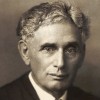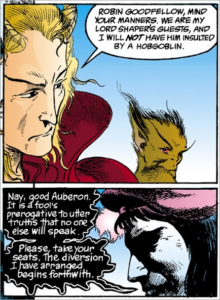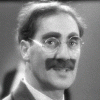KEATING: Now, language was developed for one endeavor, and that is? Mr. Anderson? Come on! Are you a man or an amoeba? Mr. Perry?
NEIL: Uh, to communicate.
KEATING: No! To woo women!
Quotations about:
speech
Note not all quotations have been tagged, so Search may find additional quotes on this topic.
For it is a mad world and it will get madder if we allow the minorities, be they dwarf or giant, orangutan or dolphin, nuclear-head or water-conversationalist, pro-computerologist or Neo-Luddite, simpleton or sage, to interfere with aesthetics. The real world is the playing ground for each and every group, to make or unmake laws. But the tip of the nose of my book or stories or poems is where their rights end and my territorial imperatives begin, run and rule. If Mormons do not like my plays, let them write their own. If the Irish hate my Dublin stories, let them rent typewriters. If teachers and grammar school editors find my jawbreaker sentences shatter their mushmilk teeth, let them eat stale cake dunked in weak tea of their own ungodly manufacture.
Ray Bradbury (1920-2012) American writer, futurist, fabulist
Fahrenheit 451, “Coda” Afterword (1979 ed.)
(Source)
Did you ever think that making a speech on economics is a lot like pissin’ down your leg? It seems hot to you, but it never does to anyone else.
Lyndon B. Johnson (1908-1973) American politician, educator, US President (1963-69)
Private comment to John Kenneth Galbraith (mid-1960s)
(Source)
Quoted in Galbraith, Name-Dropping, ch. 11 (1999).
Speak properly, and in as few words as you can, but always plainly; for the End of Speech is not Ostentation, but to be understood.
William Penn (1644-1718) English writer, philosopher, politician, statesman
Some Fruits of Solitude, Part 2, “Of Conduct and Speech,” #122 (1682)
(Source)
Those who won our independence by revolution were not cowards. They did not fear political change. They did not exalt order at the cost of liberty. To courageous, self-reliant men, with confidence in the power of free and fearless reasoning applied through the processes of popular government, no danger flowing from speech can be deemed clear and present, unless the incidence of the evil apprehended is so imminent that it may befall before there is opportunity for full discussion. If there be time to expose through discussion the falsehood and fallacies, to avert the evil by the processes of education, the remedy to be applied is more speech, not enforced silence.
Good words are worth much, and cost little.
George Herbert (1593-1633) Welsh priest, orator, poet.
Jacula Prudentum, or Outlandish Proverbs, Sentences, &c. (compiler), # 155 (1640 ed.)
(Source)
DREAM: It is a fool’s prerogative to utter truths that no one else will speak.
Neil Gaiman (b. 1960) British author, screenwriter, fabulist
Sandman, Book 3. Dream Country, # 19 “A Midsummer Night’s Dream” (1990)
(Source)
Because the story includes William Shakespeare as a character, and is named after Shakespeare's play (which is performed in the story), this line is sometimes misattributed to Shakespeare himself.
See also this later comment by Dream.
We must know what we think and speak out, even at the risk of unpopularity. In the final analysis, a democratic government represents the sum total of the courage and the integrity of its individuals. It cannot be better than they are.
Already I had learned from thee that because a thing is eloquently expressed it should not be taken to be as necessarily true; nor because it is uttered with stammering lips should it be supposed false. Nor, again, is it necessarily true because rudely uttered, nor untrue because the language is brilliant. Wisdom and folly both are like meats that are wholesome and unwholesome, and courtly or simple words are like town-made or rustic vessels — both kinds of food may be served in either kind of dish.
[Iam ergo abs te didiceram nec eo debere videri aliquid verum dici, quia eloquenter dicitur, nec eo falsum, quia incomposite sonant signa labiorum; rursus nec ideo verum, quia impolite enuntiatur, nec ideo falsum, quia splendidus sermo est, sed perinde esse sapientiam et stultitiam sicut sunt cibi utiles et inutiles, verbis autem ornatis et inornatis sicut vasis urbanis et rusticanis utrosque cibos posse ministrari.]
Augustine of Hippo (354-430) Christian church father, philosopher, saint [b. Aurelius Augustinus]
Confessions, Book 5, ch. 6 / ¶ 10 (5.6.10) (c. AD 398) [tr. Outler (1955)]
(Source)
(Source (Latin)). Alternate translations:
Of Thyself therefore had I now learned, that neither ought any thing to seem to be spoken truly, because eloquently; nor therefore falsely, because the utterance of the lips is inharmonious; nor, again, therefore true, because rudely delivered; nor therefore false, because the language is rich; but that wisdom and folly are as wholesome and unwholesome food; and adorned or unadorned phrases as courtly or country vessels; either kind of meats may be served up in either kind of dishes.
[tr. Pusey (1838)]
Of Thyself, therefore, had I now learned that neither ought anything to seem to be spoken truly, because eloquently; nor therefore falsely, because the utterance of the lips is inharmonious; nor, again, therefore true, because rudely delivered; nor therefore false, because the language is rich; but that wisdom and folly are as wholesome and unwholesome food; and adorned or unadorned phrases, as courtly or country vessels: either kind of meats may be served up in either kind of dishes.
[ed. Shedd (1860)]
From Thee, therefore, I had now learned, that because a thing is eloquently expressed, it should not of necessity seem to be true; nor, because uttered with stammering lips, should it be false nor, again, perforce true, because unskillfully delivered; nor consequently untrue, because the language is fine; but that wisdom and folly are as food both wholesome and unwholesome, and courtly or simple words as town-made or rustic vessels, -- and both kinds of food may be served in either kind of dish.
[tr. Pilkington (1876)]
I had learned, then, from Thee, that neither ought a thing to be regarded as true because it is eloquently uttered, nor on the other hand false because awkwardly expressed; neither is it true because the diction is ungraceful, nor false because clothed in glowing language; but that truth and folly are like wholesome and hurtful food, and language ornate and bald like fine and plain dishes, and either kind of meat may be served in either kind of dish.
[tr. Hutchings (1890)]
Already I had learned from Thee, that nothing ought to seem true because it is well expressed, nor false because the word-symbols are inelegant; yet again, that nothing is true because rudely delivered, nor false because the diction is brilliant; but that wisdom and folly are like meats that are wholesome or unwholesome, and that either kind of meat can be served up in silver or in delf, that is to say, in courtly or in homely phrase.
[tr. Bigg (1897), 5.6.2]
From You then I learned that a thing was not bound to be true because uttered eloquently, nor false because the utterance of the lips is ill-arranged; but that on the other hand a thing is not necessarily true because badly uttered, nor false because spoken magnificently. For it is with wisdom and folly as with wholesome and unwholesome food: just as either kind of food can be served equally well in rich dishes or simple, so plain or beautiful language may clothe either wisdom or folly indifferently.
[tr. Sheed (1943)]
Already, therefore, I had learned from you that nothing should be held true merely be-cause it is eloquently expressed, nor false because its signs sound harsh upon the lips. Again, I learned that a thing is not true because rudely uttered, nor is it false because its utterance is splendid. I learned that wisdom is like wholesome food and folly like unwholesome food: they can be set forth in language ornate or plain, just as both kinds of food can be served on rich dishes or on peasant ware.
[tr. Ryan (1960)]
But in your wonderful, secret way, my God, you had already taught me that a statement is not necessarily true because it is wrapped in fine language or false because it is awkwardly expressed. I believe that it was you who taught me this, because it is the truth and there is no other teacher of the truth besides yourself, no matter how or where it comes to light. You had already taught me this lesson and the converse truth, that an assertion is not necessarily true because it is badly expressed or false because it is finely spoken. I had learnt that wisdom and folly are like different kinds of food. Some are wholesome and others are not, but both can be served equally well on the finest china dish or the meanest earthenware. In just the same way, - wisdom and folly can be clothed alike in plain words or the finest flowers of speech.
[tr. Pine-Coffin (1961)]
I had now learned this from you: that a thing is not necessarily true for being expressed eloquently, nor necessarily false if the sounds made by the lips are imperfectly pronounced; nor, on the other hand, is a thing true simply because it is expressed in a rough and ready way, nor false because it is uttered in a fine style. For with wisdom and folly the same thing holds good as with wholesome and unwholesome food. You can have silver or earthenware dishes on the table, just as you can have a decorated or undecorated use of language; either kind of food can be served in either kind of dish.
[tr. Warner (1963)]
I believe that because you taught me and I had already learned from you that nothing should be deemed truly spoken because it is eloquently spoken, nor false because the indications of the lips are ill-arranged. Conversely, uncouth expression does not make something true, nor polished delivery make truth false. As with wholesome and unwholesome food, so it is with wisdom and folly, and as with adorned and unadorned language, so good food and bad can be served up in elegant or rustic dishes.
[tr. Blaiklock (1983)]
KING: ’Tis well said again,
And ’tis a kind of good deed to say well.
And yet words are no deeds.William Shakespeare (1564-1616) English dramatist and poet
Henry VIII, Act 3, sc. 2, l. 195ff (3.2.195-197) (1613)
(Source)
The only advice I ever give actors is to learn to speak clearly, to project your voice without shouting — and to move about the stage gracefully, without bumping into people.
Noël Coward (1899-1973) English playwright, actor, wit
Quoted in Leonard Lyons, “The Lyons Den” syndicated column (16 Aug 1954)
Variants attributed to Coward:Alternately, another Lyons Den column (24 Jan 1955) quoted Lynn Fontanne, in talking about her acting style with her husband Alfred Lunt:
- "You ask my advice about acting? Speak clearly, don't bump into the furniture and if you must have motivation, think of your pay packet on Friday."
- "Just say the lines and don't trip over the furniture." [Dick Richards, The Wit of Noël Coward (1968)]
We read the lines so that people can hear and understand them; we move about the stage without bumping into the furniture or each other; and, well that’s it.
Coward and Fontanne were good friends, and may well have discussed the concepts here previously, or shared the idea one to the other.
The quote is also attributed to Lunt, and to Spencer Tracy.
More discussion about this quotation:
Speak when you are angry and you will make the best speech you will ever regret.
Groucho Marx (1890-1977) American comedian [b. Julius Henry Marx]
(Attributed)
Quoted by Ever Star, "Inside TV," Greensboro Record (3 Nov 1954). Also attributed to Ambrose Bierce, Henry Ward Beecher, and Lawrence J. Peter. More research and discussion here.
VOLUMNIA: Action is eloquence.
William Shakespeare (1564-1616) English dramatist and poet
Coriolanus, Act 3, sc. 2, l. 95 (3.2.95) (c. 1608)
(Source)






















